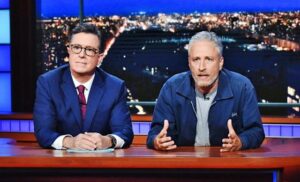Jon Stewart Ignites Firestorm: CBS Left Reeling After His Defiant Late-Night Outburst
 ]
]
Late-night television has always been a place for sharp wit and sly commentary, but on one unforgettable evening in mid-August, Jon Stewart turned the stage into a battleground. What began as a routine segment quickly became one of the most talked-about moments in recent TV history — a moment where Stewart openly challenged the very network broadcasting his words.
The Silence Before the Storm
In the days leading up to the show, CBS had abruptly pulled the plug on Stephen Colbert’s program, a decision that left fans stunned and insiders whispering about corporate maneuvering tied to ongoing mergers. While executives hoped the story would quietly fade, Stewart had other plans.
That night, the audience sensed something different. Gone was the usual playful banter that opened the show. Instead, Stewart stood center stage in a near-silence that demanded attention. His voice, steady and deliberate, cut through the air as he broke the unspoken rule: don’t question the network.

“SACK THE F* UP”
And then came the moment. With a sudden surge of passion, Stewart raised his voice and delivered a chant that would ripple across the nation:
“SACK THE F UP.”*
The crowd roared, joining him in unison. It wasn’t comedy. It wasn’t satire. It was a direct, unfiltered rebuke aimed squarely at the executives upstairs.
Viewers at home felt it instantly — the sense that a line had been crossed, that Stewart had transformed late-night chatter into a rallying cry.

Chaos in the Control Room
Behind the cameras, CBS executives were in disbelief. Control room staff watched as their grip on the narrative slipped through their fingers. Phones buzzed endlessly. Lawyers scrambled. Calls went unanswered.
The network had banked on silence and compliance. Instead, Stewart had turned their own platform into a megaphone against them.
From Segment to Movement
Within hours, clips of Stewart’s fiery chant spread across social media like wildfire. Hashtags trended. Commentators debated whether this was protest, performance, or a new era of defiance in entertainment.
For millions of frustrated viewers, however, the message was clear: Stewart had voiced the anger they had long felt about corporate influence in media.
CBS tried to downplay the controversy in the following days, but the damage was done. What was meant to be a single outburst had already grown into something larger — a movement questioning how much control networks should have over the voices they broadcast.

A New Chapter in Late-Night
Stewart’s explosive stand didn’t just shake CBS. It raised a larger cultural question: what role should comedians and late-night hosts play in confronting power?
His words weren’t just a defense of a friend. They were a declaration that media figures, when pushed too far, can become the very resistance networks fear most.
As audiences and critics await CBS’s next move, one thing is certain: late-night television may never look the same again. And Jon Stewart — once again — has proven he is more than a comedian. He is a voice unwilling to be silenced.